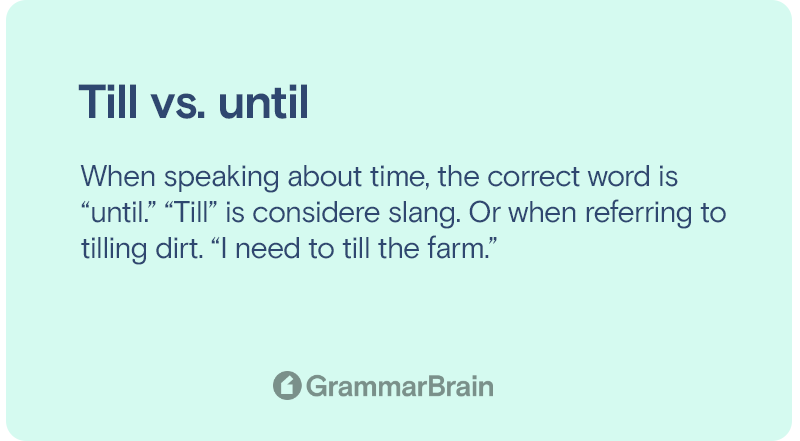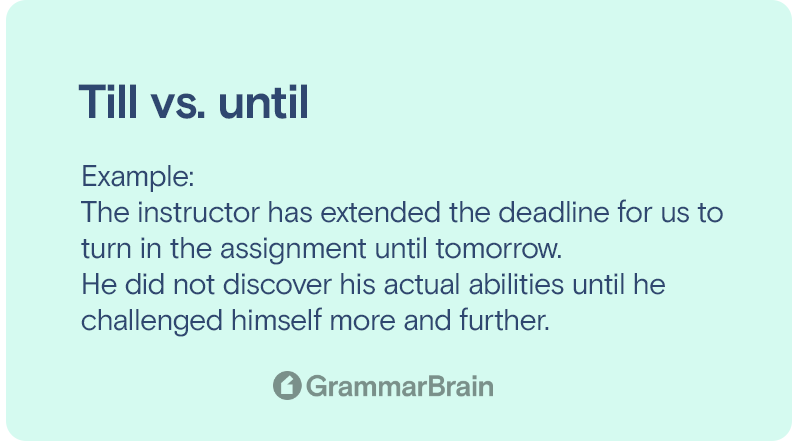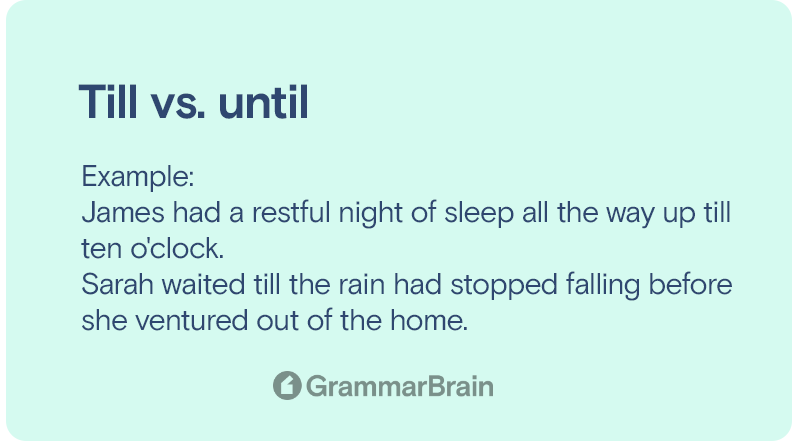Is it till or until? When should I use “till?” And when should I use “until?” “Till” and “Until” can cause a lot of confusion. It’s not just you; there have been a lot of other people who have experienced the same thing.
Till vs. until: The proper usage
How, therefore, can it be ensured that the terms “till” and “until” are being used appropriately whenever being employed in writing?
Let’s have a look at the distinction between these two terms, until and till, because they tend to be used interchangeably.

What is the primary distinction between till and until?
Both ’till’ and ‘until’ signify the same thing. Use any one of these terms interchangeably and synonymously with the other.
The only thing that differentiates the first one from the second is that the first one is utilized more frequently than the second one.
Both of these phrases refer to the same thing, which is an action or occurrence that has been occurring up to a specific moment in time.
The term “until” is frequently included in official notifications, letters, and other types of written communication. The term “till,” on the other hand, has a more laid-back vibe to it.
Both of these terms have the exact same meaning regardless of whether they are used as a preposition or a conjunction. They are extremely versatile.
Substitute one of these words for another at any time without causing any confusion.

When to use until in a sentence?
Let’s have a look at what until implies before we move on to discussing when to apply it.
So, what exactly does ‘until’ imply?
Until is a preposition. This phrase indicates up until the moment or time that was discussed.
The phrase “until the end of the world” is a prepositional phrase. It refers to all of the time that will pass between now and the end of the world, whenever that may occur.
The period between now and when the speaker next appears is denoted by the phrase “until I get back.”
Here are a few instances:
- The instructor has extended the deadline for us to turn in the assignment until tomorrow.
- He did not discover his actual abilities until he challenged himself more and further.
- Sarah instructed him to hold off until the cake had a chance to cool down.
- The national park is going to be closed until after the winter season.

When to use till
Let’s start with a definition of till before we move on to discussing how the term should be used properly.
So, what exactly does it mean to “till”?
The word till can also have a variety of meanings. The term may be used as either a noun or a verb.
However, in order to make things clearer, let’s just refer to until as an abbreviated version of the word till.
Till is a more casual alternative of until that may be used in the same situations but has a less formal meaning.
The following are some examples:
- James had a restful night of sleep all the way up till ten o’clock.
- Sarah waited till the rain had stopped falling before she ventured out of the home.
- James could not contain his excitement till the arrival of the pizza at his apartment. He started eating some rice that had been left behind.
- Sarah had given her word that she will toil away till the day she passes away.
Change the word till to until in any of the statements above without altering the meaning in any way. Some authors find that till reads somewhat more naturally, and its shorter length might be advantageous in certain contexts.
As a result of our discussion of till and until, there is a third term that contributes to the misunderstanding. The word is til. Now, let’s look at what this actually implies.
When spelling out the word until, many people make the spelling error “til.” Because until only contains one L, we may expect the term to be shortened to til given that structure.
We would be gravely mistaken in this assumption. Til is an ancient term that eventually evolved into till later in the language’s history. Til, along with its apostrophe-heavy relatives ’til and ’till, is an erroneous form of the word.
How to know the distinction between till and until?
The word till is used in a less formal context than until.
Choose one of these two options whenever needed. They are each right in their own way. However, do not say til or ’til because they are regarded to be misspellings of the word.
It is possible that the word until, which is slightly more official than till. It would be more suitable for formal writing, such as that done in the office or at a university.
FAQs
1. Which one should you use? Till or until?
The word “until” denotes the time at which something will occur, start, or terminate. The word until has the same meaning as the word till. Therefore, either one of these might be used in place of the other.
2. When do you use until?
The word “until” is a preposition that indicates continuity up to a certain point in time.
3. How is “till” used in slang?
“Till” is used in all the same ways as “until.” For example, “We waited till dawn to start moving.” The two words can be interchangeable when referring to informal language. “Till” has a widespread use in the English language amongst Gen-Z and millennial groups. They consider it the shortened form of “until.”
Sources:
- Difference between Till and Until | Till vs Until
- What is the difference between until and till?
- Until, Till, or ’Til
- Till vs. Until – What’s the Difference?
Inside this article
Fact checked:
Content is rigorously reviewed by a team of qualified and experienced fact checkers. Fact checkers review articles for factual accuracy, relevance, and timeliness. Learn more.
Core lessons
Glossary
- Abstract Noun
- Accusative Case
- Anecdote
- Antonym
- Active Sentence
- Adverb
- Adjective
- Allegory
- Alliteration
- Adjective Clause
- Adjective Phrase
- Ampersand
- Anastrophe
- Adverbial Clause
- Appositive Phrase
- Clause
- Compound Adjective
- Complex Sentence
- Compound Words
- Compound Predicate
- Common Noun
- Comparative Adjective
- Comparative and Superlative
- Compound Noun
- Compound Subject
- Compound Sentence
- Copular Verb
- Collective Noun
- Colloquialism
- Conciseness
- Consonance
- Conditional
- Concrete Noun
- Conjunction
- Conjugation
- Conditional Sentence
- Comma Splice
- Correlative Conjunction
- Coordinating Conjunction
- Coordinate Adjective
- Cumulative Adjective
- Dative Case
- Determiner
- Declarative Sentence
- Declarative Statement
- Direct Object Pronoun
- Direct Object
- Diction
- Diphthong
- Dangling Modifier
- Demonstrative Pronoun
- Demonstrative Adjective
- Direct Characterization
- Definite Article
- Doublespeak
- False Dilemma Fallacy
- Future Perfect Progressive
- Future Simple
- Future Perfect Continuous
- Future Perfect
- First Conditional
- Irregular Adjective
- Irregular Verb
- Imperative Sentence
- Indefinite Article
- Intransitive Verb
- Introductory Phrase
- Indefinite Pronoun
- Indirect Characterization
- Interrogative Sentence
- Intensive Pronoun
- Inanimate Object
- Indefinite Tense
- Infinitive Phrase
- Interjection
- Intensifier
- Infinitive
- Indicative Mood
- Participle
- Parallelism
- Prepositional Phrase
- Past Simple Tense
- Past Continuous Tense
- Past Perfect Tense
- Past Progressive Tense
- Present Simple Tense
- Present Perfect Tense
- Personal Pronoun
- Personification
- Persuasive Writing
- Parallel Structure
- Phrasal Verb
- Predicate Adjective
- Predicate Nominative
- Phonetic Language
- Plural Noun
- Punctuation
- Punctuation Marks
- Preposition
- Preposition of Place
- Parts of Speech
- Possessive Adjective
- Possessive Determiner
- Possessive Case
- Possessive Noun
- Proper Adjective
- Proper Noun
- Present Participle
- Prefix
- Predicate



